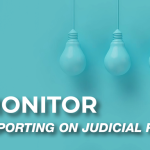
20/10/2017 COURT ADOPTS CLAIM OF JOURNALIST TUFIK SOFTIĆ AGAINST THE STATE OF MONTENEGRO
20/10/2017
2/11/2017 ON THE INTERNATIONAL DAY TO END IMPUNITY FOR CRIMES AGAINST JOURNALISTS
02/11/201722/10/2017 Determining Accountability for Breach of Judicial Ethics in Montenegro (Operation of the Commission on the Code of Judicial Ethics 2011-2016)
The Commission on the Code of Judicial Ethics in the first five years of its operation 2011-2016 did not fulfill expectations regarding strengthening impartiality and accountability of judges. On the contrary, the Commission, which was established in October 2011 as a specialized body to monitor the application of rules of judicial ethics, did not come across as impartial. The Commission’s decisions were most often based only on the statements of judges and not on objective fact-finding and sound reasoning. The Commission never initiated a single disciplinary proceeding against a judge, on occasions declared itself incompetent without providing reasons and omitted to provide interpretation of the Code that would be useful for its future implementation.
These and other conclusions result from report “Establishing accountability for breach of judicial ethics in Montenegro – Operation of the Commission on the Code of Judicial Ethics 2011-2016”, edited by Tea Gorjanc Prelević, executive director of NGO Human Rights Action (HRA). The report is available in printed form upon request from HRA.
The analysis covered all decisions made by the Commission in the five year period, a total of 47, out of which the Commission found violations of the Code in 5 cases. In 8 cases the Commission declared itself incompetent and in one case the procedure was suspended or the initiative had been rejected.
The reasoning of the Commission’s decisions was generally vague, unclear and incomplete. The decisions did not always indicate actual reasons of the complaint. Sometimes the Commission overlooked some of the allegations raised in the complaint, and often lacked clear statement as to the basis for adopting a decision. Some improvement in this regard was recorded only in 2016.
On the other side, the Judicial Council, which adopted annual reports on operation of the Commission, had in no way influenced the Commission to improve its manner of performance.
Although the Judicial Council was supposed to correct failures in the system of accountability, in accordance with its legal obligation to ”ensure accountability and professionalism of the courts and judges”, the Judicial Council declared, without a basis in law or other regulations, that neither the Council nor the Commission are competent to evaluate the conduct of judges in cases in which a final decision had been reached. Such position was supposed to justify disregarding the complaint regarding scandalously biased conduct of judges in the case in which a victim of abuse and trafficking had been sentenced in absentia to a year in prison for allegedly giving false testimony. (More details on the case of Moldovan women victim of trafficking, assessed also by CoE and OSCE, are available here).
In accordance with the conducted analysis i.e. with reached conclusions, the report contains 22 recommendations for improving the regulations and actions of the Commission and the Judicial Council.
Prior to publication, the report was submitted to the Chairman of the Commission on the Code of Judicial Ethics and member of the Judicial Council, Dobrica Sljivančanin, and members of the Commission, judges of the Supreme Court of Montenegro, Hasnija Simonović and Dušanka Radović, who declined to comment and declared that the author of the report “has no legal authority to comment on the final decisions.”
HRA, however, insists on the freedom of expression in a democratic society, which includes an argumentative statements on public interest topics, such as deciding on judicial ethics by official and public bodies. The right to comment on the decisions of the Commission on the Code of Judicial Ethics is based on the Universal Declaration of Human Rights (Article 19), the International Covenant on Civil and Political Rights (Article 19), the European Convention on Human Rights (Article 10) and the Constitution of Montenegro (Article 47).
The report was created within the framework of the project “Judicial Reform Monitoring” supported by the European Union through the Delegation of the European Union to Montenegro and the Kingdom of the Netherlands, conducted by HRA and the Center for Monitoring and Research (CeMI) in the period from August 2014 to April 2017.
HRA publications are available here and, on request, are available and printed.







 English
English